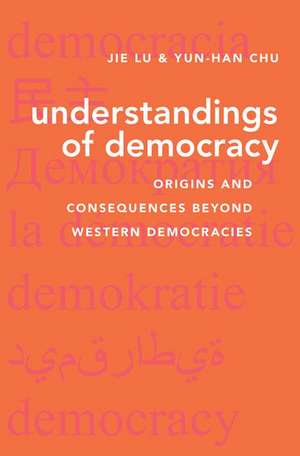Understandings of Democracy: Origins and Consequences Beyond Western Democracies
Autor Jie Lu, Yun-han Chuen Limba Engleză Hardback – 24 mar 2022
Preț: 357.58 lei
Nou
Puncte Express: 536
Preț estimativ în valută:
68.44€ • 71.18$ • 57.35£
68.44€ • 71.18$ • 57.35£
Carte disponibilă
Livrare economică 21 februarie-07 martie
Livrare express 06-12 februarie pentru 32.69 lei
Preluare comenzi: 021 569.72.76
Specificații
ISBN-13: 9780197570401
ISBN-10: 0197570402
Pagini: 232
Dimensiuni: 244 x 165 x 28 mm
Greutate: 0.45 kg
Editura: Oxford University Press
Colecția OUP USA
Locul publicării:New York, United States
ISBN-10: 0197570402
Pagini: 232
Dimensiuni: 244 x 165 x 28 mm
Greutate: 0.45 kg
Editura: Oxford University Press
Colecția OUP USA
Locul publicării:New York, United States
Recenzii
How people understand and define democracy matters. Many scholars have used the fact that people have widely different understandings to cast doubt on the value of asking people survey questions about democracy, especially in the developing world. But Lu and Chu show how these diverse understandings arise, and, in turn, how they shape people's willingness to trade democracy for other desired goods. This has enormous consequences for understanding the current predicament of democracy across the globe.
People around the world all say they love democracy, but Lu and Chu show that they have different ideas about what democracy means—and that the differences matter for regime support and political participation. Based on survey data from 72 societies, this rich, nuanced analysis sets a new standard for comparative studies of political culture and behavior.
Crucially, the book shows how the relative distribution of these four groups differs throughout the world. This is important because benefit seekers those who choose outcomes over procedures may accept clearly undemocratic procedures, or even regimes, if they get their desired policy outcomes. The book also seeks to determine what contextual and demographic factors led to these varying understandings of democracy, and how individuals consequently vary in terms of democratic satisfaction and political participation. This comprehensive work provides thorough data and analysis.
Lu and Chu's study is methodologically sound and at the cutting edge of advanced cross-national survey research...Logically structured, eloquently written, firmly embedded in empirical theory, and richly illustrated, this monograph provides meaningful and genuinely novel insights.
People around the world all say they love democracy, but Lu and Chu show that they have different ideas about what democracy means—and that the differences matter for regime support and political participation. Based on survey data from 72 societies, this rich, nuanced analysis sets a new standard for comparative studies of political culture and behavior.
Crucially, the book shows how the relative distribution of these four groups differs throughout the world. This is important because benefit seekers those who choose outcomes over procedures may accept clearly undemocratic procedures, or even regimes, if they get their desired policy outcomes. The book also seeks to determine what contextual and demographic factors led to these varying understandings of democracy, and how individuals consequently vary in terms of democratic satisfaction and political participation. This comprehensive work provides thorough data and analysis.
Lu and Chu's study is methodologically sound and at the cutting edge of advanced cross-national survey research...Logically structured, eloquently written, firmly embedded in empirical theory, and richly illustrated, this monograph provides meaningful and genuinely novel insights.
Notă biografică
Jie Lu is Ye Chenghai Chair Professor of Political Science at the Renmin University of China. Before joining the Renmin University, he taught at American University in Washington, DC. He studies local governance, the political economy of institutional change, public opinion, and political participation. His regional expertise focuses on the Greater China Region and East Asia. His work has appeared in Comparative Political Studies, Comparative Politics, Political Psychology, Politics & Society, Political Communication, Journal of Democracy, and other journals. He is also the author of Varieties of Governance in China: Migration and Institutional Change in Chinese Villages.Yun-han Chu is an academician of Academia Sinica, Distinguished Research Fellow of the Institute of Political Science at Academia Sinica, and Professor of Political Science at National Taiwan University. He serves concurrently as President of Chiang Ching-kuo Foundation for International Scholarly Exchange. Heis the founder and director of Asian Barometer Survey, a cross-national survey on political values, citizen politics, and the quality of democracy covering 19 Asian societies. He is the author, co-author, editor, or co-editor of seventeen books. Among his recent English publications are Democracy in East Asia: A New Century, Dynamics of Democracy in Taiwan: The Ma Ying-jeou Years, and The Decline of the Western-Centric World and the Emerging New Global Order.
